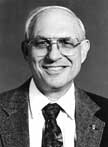by Lee C. Gerhard,
Director and State Geologist

Tradeoffs are inevitably made between the activities that provide energy, minerals, timber, and food, and the need and desire to preserve ecosystem services.
Science
in public policy has rarely been so visible as in this legislative session
and in the national realm. In the Kansas River valley, access to sand
and gravel resources is in conflict with recreational actvities; throughout
the state, concerns have been voiced about the impact on ground-water
quality of large, corporate animal feeding and rearing facilities. Nationally,
discussion of a treaty to reduce carbon dioxide emissions to mitigate
global warming has generated much attention. Here in Kansas, the Legislature
is taking action, while nationally, rhetoric continues without the science
to reach either consensus or conclusion.
Maintaining detachment, not taking sides on issues, is not easy. I want
to publicly commend the Survey team that studied sand and gravel resources
of the Kansas River for its report on the needs and supplies of construction-materials
resources in Kansas. They accomplished their task without comment on the
intense debate over recreational useage of portions of these resource-access
areas. They accepted the criticism from various special interest groups,
stayed the course, and provided much-needed information to the Legislature
and all the participants in the debate.
Increasing conflicts between recreation, environmental quality, and natural-resource
demand have been a personal interest for years. This fall, under the banner
of professional geological societies, the Kansas Geological Survey, and
some Federal agencies, I am convening a conference focusing on these topics.
This conference brings together scientists with a range of expertise and
concerns about the environment and resources. The following statement
from the conference organizers describes its purpose and neatly summarizes
this conflict.
Society demands resources to maintain a standard of living commensurate with people’s expectations, and a suitable level of environmental quality is inherent to this demand. Tradeoffs are inevitably made between the activities that provide energy, minerals, timber, and food, and the need and desire to preserve ecosystem services. Such tradeoffs are often highly controversial and politically volatile . . . . Differences between geological and ecological views may reflect real and inherent tensions arising from the growth of industrialized society, but scientists must seek common ground in order to balance resource and environmental goals. Failure will likely result in alternating extremes of exploitation and preservation. The turn of a popular phrase can change the course of public opinion, but fundamental geologic and biologic processes are not swayed by polls. If we are not careful, true conservation will be lost in rhetoric and scrambling for dominance of perspective. We must begin our dialogue.
I hope we can make a difference.

With the advent of the World Wide Web, Kansas water
data are increasingly available. From the KGS home
page, the Hydrogeology button links users to several large, easy-to-use
water data bases that are regularly updated and expanded.
The KGS Water
Information Storage and Retrieval Database includes data on thousands
of wells in the state, including wells where water levels are measured
as part of the state’s water-level measurement program. Information
on those wells includes January 1998 water levels and all historical water-level
measurements. The data base can be searched by county or by legal description.
A data base of Water
Well Completion Records is also being developed. Searchable by county
or legal description, this data set consists of water-well completion
records, forms filed by water-well drillers with the Kansas Department
of Health and Environment for water wells drilled in the state. This data
set shows the location, type, use, casing, nearest source of contamination,
and other information about wells.
To check on streamflow in the state’s rivers and creeks, look at the U.S. Geological Survey’s Kansas District home page. It offers current data from the U.S. Geological Survey stream-gaging stations in the state.
Online February 10, 2003
Comments to: lbrosius@kgs.ku.edu
Kansas Geological Survey
URL:http://www.kgs.ku.edu/Publications/GeoRecord/1998/vol4.2/Page2.html